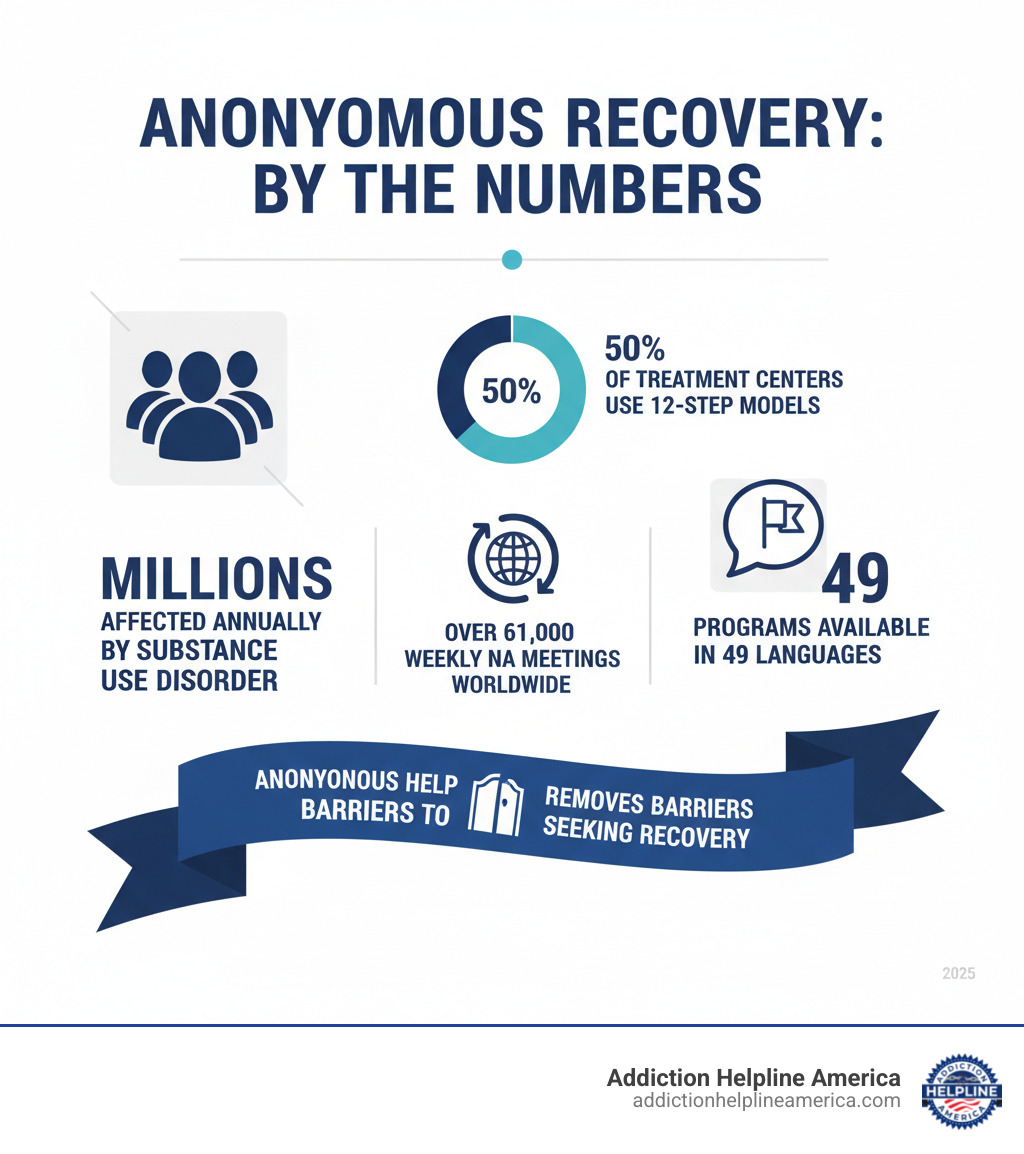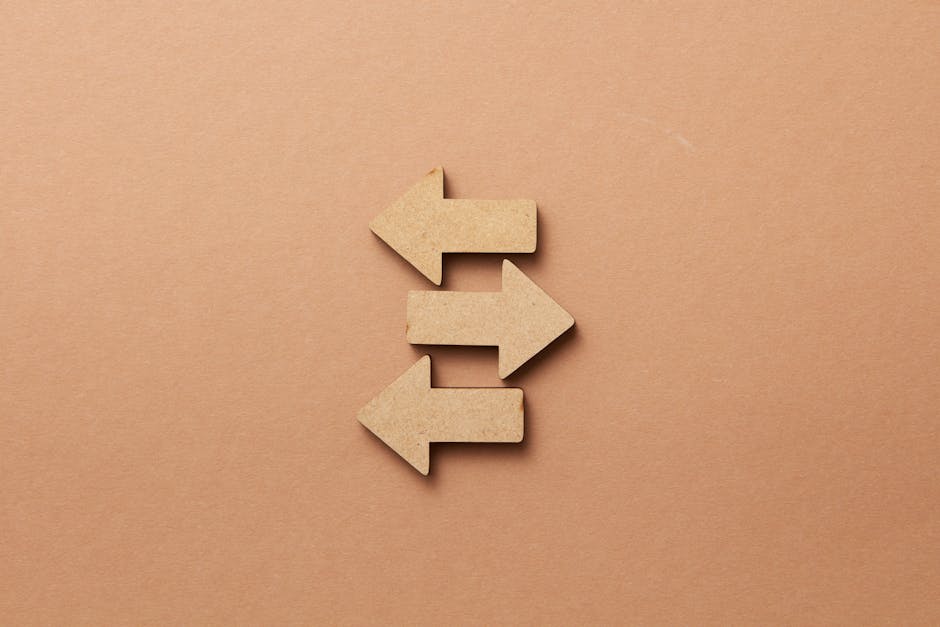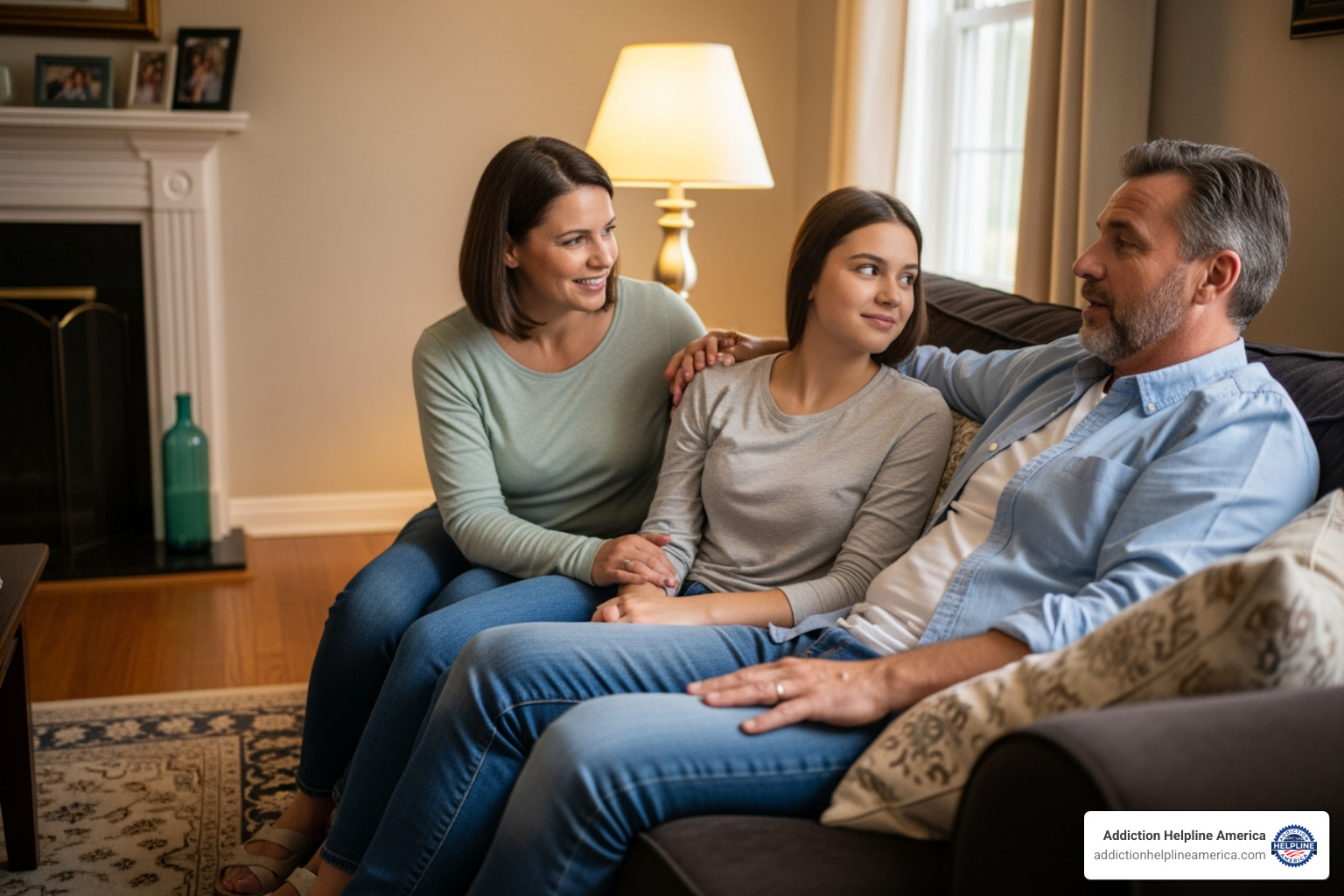
Why Anonymous Addiction Help Matters for Your Recovery Journey
Anonymous addiction help offers a lifeline for those with substance use disorders who need support without fear of judgment. These peer-led programs provide confidential recovery support through meetings and community connection—all at no cost and without requiring you to reveal your identity.
Quick answers to your most pressing questions:
- What is it? Peer-led support groups (like AA, NA, CA) where people help each other recover from addiction through shared experience.
- How does anonymity work? First names only, strict confidentiality principles, and no records are kept.
- Is it free? Yes, completely free with no dues or fees required.
- Do I need to be religious? No—spiritual concepts can be interpreted personally, and secular alternatives like SMART Recovery exist.
- What happens at meetings? Members share experiences, listen to others, and work through recovery steps together.
- Can family members get help too? Yes, through Al-Anon, Nar-Anon, and Alateen support groups.
- How do I find meetings? Online directories for AA, NA, CA, and other groups list thousands of local and virtual meetings.
The fear of being judged keeps many from seeking help. According to SAMHSA, stigma remains a powerful barrier to treatment for millions of Americans. Anonymous addiction help programs remove that barrier by creating safe spaces where you can share honestly without risking your reputation or career.
For over 80 years, these fellowships have helped millions recover. The core principle is simple: one person in recovery helping another. It’s not therapy, but a community of people who understand because they’ve been there themselves.
At Addiction Helpline America, we connect individuals and families with the right anonymous addiction help resources and treatment options for their unique needs. Finding the right support—whether a 12-Step program or a secular alternative—is a critical first step toward lasting recovery.
Anonymous addiction help further reading:
What is Anonymous Addiction Help? The Core Principles Explained
When someone mentions anonymous addiction help, they’re usually talking about peer-led support groups like Alcoholics Anonymous (AA), Narcotics Anonymous (NA), and Cocaine Anonymous (CA). These aren’t therapy sessions; they’re built on mutual aid—people who’ve walked the same path sharing what they’ve learned.
The story began in 1935 when two men, Bill W. and Dr. Bob, found they could stay sober by helping each other. Their experiences became the foundation of Alcoholics Anonymous and its core text, “The Big Book.” It introduced the idea that addiction is a disease managed through spiritual principles and honest connection. By the 1950s, Narcotics Anonymous adapted this model for all substance use, and for over 80 years, these fellowships have helped millions. The model is simple: one person in recovery helps another.
More info about getting help for drug addiction
The Philosophy: Admitting Powerlessness and Embracing a Higher Power
The philosophy behind 12-Step fellowships starts with a core truth: addiction is a disease, not a character flaw. This removes the burden of shame. The first step is admitting you’re powerless over your addiction and that your life has become unmanageable. “Powerless” doesn’t mean helpless; it means recognizing that willpower alone isn’t enough and that you need help.
From this admission comes spiritual growth. The programs refer to a “Higher Power” or “God as we understood Him,” but this concept is intentionally flexible. Your Higher Power can be anything bigger than yourself—God, the universe, the collective wisdom of the group, or even the principle of love. The goal isn’t religious conversion but to stop trying to control everything alone and lean on an outside source of strength. This allows people of all beliefs, including atheists and agnostics, to find value in the program.
The 12-Step Framework: A Guide to Recovery
The heart of AA, NA, and CA is the 12-Step framework, a structured path to recovery. These steps are a blueprint for internal change.
Step 1: We admitted we were powerless over alcohol—that our lives had become unmanageable.
Step 2: Came to believe that a Power greater than ourselves could restore us to sanity.
Step 3: Made a decision to turn our will and our lives over to the care of God as we understood Him.
Step 4: Made a searching and fearless moral inventory of ourselves.
Step 5: Admitted to God, to ourselves, and to another human being the exact nature of our wrongs.
Step 6: Were entirely ready to have God remove all these defects of character.
Step 7: Humbly asked Him to remove our shortcomings.
Step 8: Made a list of all persons we had harmed, and became willing to make amends to them all.
Step 9: Made direct amends to such people wherever possible, except when to do so would injure them or others.
Step 10: Continued to take personal inventory and when we were wrong promptly admitted it.
Step 11: Sought through prayer and meditation to improve our conscious contact with God as we understood Him, praying only for knowledge of His will for us and the power to carry that out.
Step 12: Having had a spiritual awakening as the result of these steps, we tried to carry this message to alcoholics and to practice these principles in all our affairs.
The journey involves admitting you need help, taking an honest moral inventory (Step 4), confessing your mistakes (Step 5), becoming willing to change (Steps 6 & 7), and making amends (Steps 8 & 9). The final steps focus on maintenance through self-reflection (Step 10), spiritual connection (Step 11), and service to others (Step 12). Members work these steps with a sponsor, often leading to a spiritual awakening—a fundamental shift in perspective. Actively working the steps is what creates lasting change.
How Anonymity and Confidentiality are Protected
The word “anonymous” in anonymous addiction help is a core spiritual principle that protects everyone. In practice, you only share your first name. This levels the playing field, allowing a CEO and a homeless person to connect as equals.
The commitment is clear: “What you hear here, when you leave here, let it stay here.” This creates a safe, non-judgmental space for complete honesty. You can share your deepest fears and mistakes without worrying they’ll leave the room. No records are kept, and no membership lists exist. This focus on principles over personalities ensures the message of recovery is what matters, not the status of the person sharing it.
At Addiction Helpline America, we know confidentiality is critical. Anonymity removes the fear of exposure that keeps so many suffering in silence, opening the door to healing.
Exploring Your Options: From 12-Step to Secular Alternatives
Recovery isn’t one-size-fits-all. The beauty of anonymous addiction help is that you have choices. While 12-Step programs like AA and NA have helped millions, they aren’t the only option. Some people connect with their spiritual principles, while others need a more secular, science-based approach. Your goal is to find the program that works for you.
Comparing AA, NA, and CA
The three major 12-Step fellowships are Alcoholics Anonymous (AA), Narcotics Anonymous (NA), and Cocaine Anonymous (CA). They all share the same 12-Step foundation but have different focuses.
- AA is the original fellowship, focused exclusively on alcohol addiction.
- NA expanded the model to welcome anyone struggling with any drug, viewing addiction as a single disease.
- CA began with a focus on cocaine but also requires abstinence from all mind-altering substances for recovery.
Here’s a quick comparison:
| Feature | Alcoholics Anonymous (AA) | Narcotics Anonymous (NA) | Cocaine Anonymous (CA) |
|---|---|---|---|
| Primary Focus | Alcohol addiction | All mind-altering substances, including alcohol | Cocaine and all other mind-altering substances |
| Core Literature | “The Big Book” (Alcoholics Anonymous) | “Basic Text” (Narcotics Anonymous) | “The Basic Text” (Cocaine Anonymous) |
| Membership Req. | A desire to stop drinking | A desire to stop using drugs | A desire to stop using cocaine and all other mind-altering substances |
| Founding Year | 1935 | 1953 | 1982 |
Many people attend meetings from different fellowships. There’s no rule against it. You can find meetings through their official websites:
What if the 12-Step Model Isn’t for Me?
The 12-Step approach doesn’t work for everyone. If the spiritual language or the concept of powerlessness doesn’t resonate with you, excellent secular alternatives exist.
SMART Recovery (Self-Management And Recovery Training) is the best-known secular option. It emphasizes self-empowerment and personal choice, using tools from cognitive-behavioral therapy (CBT) and other evidence-based methods. Instead of spiritual steps, you learn practical techniques to:
- Build and maintain motivation
- Cope with urges
- Manage thoughts, feelings, and behaviors
- Live a balanced life
There is no mention of a higher power, making it a great fit for those who prefer a scientific or psychological framework.
Find SMART Recovery meetings in person or online.
At Addiction Helpline America, we help people connect with all types of support—12-Step, secular, and more. The best program is the one you’ll engage with, and we’re here to help you find the right fit.
The Meeting Experience: How Anonymous Addiction Help Fosters Recovery
Walking into your first anonymous addiction help meeting can be intimidating, but these spaces are designed to be welcoming and non-judgmental. Meetings are the heartbeat of these fellowships, where recovery becomes real.
Different meeting formats serve different purposes. Speaker meetings feature members sharing their personal stories of addiction and recovery, which helps newcomers feel understood. Discussion meetings center on a specific recovery topic, with members sharing their related experiences. Step study meetings involve a deep dive into one of the 12 Steps, exploring how to apply it to daily life.
Meetings are either “open” or “closed.” Open meetings welcome anyone, including family and friends. Closed meetings are exclusively for those who identify with the group’s specific addiction (e.g., alcoholics in a closed AA meeting).
Crucially, you never have to share if you don’t want to. You can simply listen and absorb the support. The pressure you might imagine doesn’t exist. It’s just people sharing honestly about their struggles and victories.
More info about behaviors common to drug addicts
The Role of Sponsors and Community
Sponsorship is a unique and effective part of these programs. A sponsor is a personal guide through recovery—someone with long-term sobriety who has worked the Steps and can help you do the same. They are a mentor you can call during a craving or when struggling with a Step, providing accountability without judgment.
Sponsors often encourage newcomers to attend “90 meetings in 90 days.” This intensity helps build new habits and a strong support system during the critical early stages of recovery.
Beyond a sponsor, the entire fellowship becomes a community. You build friendships, exchange numbers, and create a safety net of people who understand. This sense of belonging is transformative for those who have been isolated by addiction. Active participation—attending meetings, working with a sponsor, and engaging in service work like making coffee—is strongly linked to better outcomes and lower relapse rates.
Benefits, Drawbacks, and Costs of Anonymous Addiction Help
It’s important to understand both the strengths and limitations of these programs.
Benefits:
- Completely free: There are no dues or fees. This removes a huge barrier to entry.
- Community support: Peer-to-peer connection reduces isolation and fosters healing.
- Global accessibility: Thousands of in-person and virtual meetings are available worldwide.
- Proven effectiveness: Research shows participation is linked to higher rates of abstinence and improved well-being.
- Anonymity: Confidentiality creates a safe space for honesty and vulnerability.
Drawbacks:
- Not professional treatment: These groups don’t provide medical detox, therapy, or medication management. They are a supplement to, not a replacement for, clinical care.
- Spiritual element: The language can be a barrier for some, even with its flexible interpretation.
- Self-directed: Recovery depends on your own initiative, which may not be enough structure for everyone.
- Varying meeting quality: It may take time to find a group that feels like the right fit.
Regarding costs, there are none. The programs are self-supporting through voluntary contributions (the 7th Tradition). A basket is passed for members to donate a dollar or two if they can, but it’s never required.
Finding the Right Support for You and Your Family
Recovery is a personal journey, and there’s no single solution. Some people thrive in 12-Step programs, while others need a secular approach or professional treatment combined with anonymous addiction help groups. Finding the right fit for your unique situation is key, especially when dealing with co-occurring disorders or family impact.
What if I Have a Co-Occurring Mental Health Disorder?
Addiction often co-exists with mental health conditions like depression or anxiety. This is called a “co-occurring disorder” or “dual diagnosis.” While traditional anonymous groups are helpful, they aren’t designed to treat complex psychiatric issues.
Specialized support is crucial. Dual Recovery Anonymous (DRA) holds meetings for people recovering from both chemical dependency and a mental illness, recognizing that both issues must be addressed together. For dual diagnosis, we strongly recommend combining peer support with professional treatment. A therapist or psychiatrist can provide evidence-based care and medication management, while support groups offer community and shared experience.
More info about dual diagnosis treatment
How to Find Anonymous Addiction Help and Support for Loved Ones
Addiction affects the entire family. Spouses, parents, and friends often feel helpless and overwhelmed. Fortunately, there is anonymous addiction help designed specifically for them.
- Al-Anon supports people affected by someone else’s drinking. It helps them understand they can’t control the addiction but can focus on their own well-being.
- Alateen offers similar support custom for teenagers.
- Nar-Anon provides support for families and friends of those struggling with drug addiction.
These groups use 12-Step principles to help family members heal. You can find local or virtual meetings online:
- Find an Al-Anon or Alateen meeting: Find an Al-Anon meeting in your area.
- Find a Nar-Anon meeting through their official website.
Finding meetings for AA, NA, or SMART Recovery is just as easy through their online directories. At Addiction Helpline America, we can help you steer all these options to find the right resources, whether it’s peer support, professional treatment, or both.
More info about how to help a drug addict
Conclusion: Your Path to Confidential Recovery Starts Here
You have real, accessible, and effective options for recovery that protect your privacy and cost nothing.
We’ve seen how anonymous addiction help programs like AA and NA use the power of shared experience to help people heal. The 12 Steps provide a flexible framework for rebuilding your life, and anonymity creates a safe space for honesty. If that model isn’t for you, secular alternatives like SMART Recovery offer evidence-based support without a spiritual focus.
Meetings provide a non-judgmental community, sponsors offer personal guidance, and specialized groups like Al-Anon and Nar-Anon extend support to families. The core benefit of these programs is that they remove the barriers of stigma and fear that keep people from seeking help.
Recovery is happening every day, one day at a time.
Sometimes, however, peer support isn’t enough. You may need professional treatment, medical detox, or specialized care for a dual diagnosis. That’s where we come in.
At Addiction Helpline America, we provide free, confidential guidance to connect you with the right help for your unique situation. Whether you need an anonymous support group, a residential treatment program, or a combination of both, our team is here to help you steer your options.
Your path to recovery starts with a single step. You don’t have to do this alone.
Our helpline is 100%
free & confidential
If you or someone you care about is struggling with drug or alcohol addiction, we can help you explore your recovery options. Don’t face this challenge alone—seek support from us.
Programs
Resources
Will my insurance
cover addiction
treatment?
We're ready to help
Find the best
drug or alcohol treatment
center
Are you or a loved one struggling with addiction? Call today to speak to a treatment expert.

















